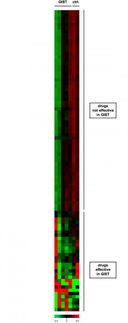Radiation exposure poses similar risk of first and second cancers in atomic bomb survivors
First large-scale study to assess how radiation influences risk of multiple cancers
Advertisement
It is well known that exposure to radiation has multiple harmful effects – including causing cancer – but until now, it has been unclear to what extent such exposure increases a person's risk of developing more than one cancer. The first large-scale study of the relationship between radiation dose and risk of multiple cancers among atomic bomb survivors in Hiroshima and Nagasaki, Japan reveals a similar risk in the development of first and second subsequent cancers.
Christopher I. Li, M.D., Ph.D., and colleagues at Fred Hutchinson Cancer Research Center led the study in collaboration with investigators at the Radiation Effects Research Foundation in Hiroshima and Nagasaki and the National Cancer Institute. The results appear in Cancer Research.
"We found that radiation exposure increased the risks of first and second cancers to a similar degree," said first author Li, a breast cancer epidemiologist and member of the Public Health Sciences Division at the Hutchinson Center. "People exposed to radiation who developed cancer also had a high risk of developing a second cancer, and the risk was similar for both solid tumors and leukemias in both men and women, regardless of age at exposure or duration between first and second primary cancers," he said.
The association between radiation exposure and risk of second cancers was particularly significant for radiation-sensitive cancers, such as those of the lung, colon, breast, thyroid and bladder, as well as leukemia.
For the study, the researchers analyzed data from participants in the Life Span Study, a group of atomic bomb survivors in Hiroshima and Nagasaki who were followed from 1950, five years after the bombings, to 2002, the most recent year through which Hiroshima and Nagasaki cancer registry data were complete. The study followed 10,031 primary cancer survivors, among whom 1,088 went on to develop second primary cancers. Stomach, lung, liver and female breast cancers were the most commonly diagnosed first and second primary cancers.
"Our findings suggest that cancer survivors with a history of radiation exposure should continue to be carefully monitored for second cancers," Li said.
In addition to clinical implications for cancer patients and others exposed to significant amounts of radiation, such research is essential to developing radiation protection limits and standards for occupational exposures, as well as planning for the consequences of widespread radiation exposure in the general population in the event of a nuclear accident, nuclear war or "dirty bomb" terrorist attack.
"We greatly appreciate having the opportunity to conduct this unique research with our Japanese colleagues who, through innumerable publications, have truly transformed the tragedy of the atomic bombings to fundamental scientific advancements that have impacted radiation protection standards and policies worldwide," Li said.























































